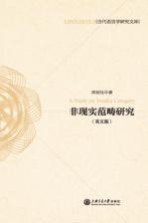图书介绍
非现实范畴研究 英文2025|PDF|Epub|mobi|kindle电子书版本百度云盘下载

- 宋丽珏著 著
- 出版社: 上海:上海交通大学出版社
- ISBN:9787313129147
- 出版时间:2015
- 标注页数:245页
- 文件大小:35MB
- 文件页数:258页
- 主题词:语言学-研究-英文
PDF下载
下载说明
非现实范畴研究 英文PDF格式电子书版下载
下载的文件为RAR压缩包。需要使用解压软件进行解压得到PDF格式图书。建议使用BT下载工具Free Download Manager进行下载,简称FDM(免费,没有广告,支持多平台)。本站资源全部打包为BT种子。所以需要使用专业的BT下载软件进行下载。如BitComet qBittorrent uTorrent等BT下载工具。迅雷目前由于本站不是热门资源。不推荐使用!后期资源热门了。安装了迅雷也可以迅雷进行下载!
(文件页数 要大于 标注页数,上中下等多册电子书除外)
注意:本站所有压缩包均有解压码: 点击下载压缩包解压工具
图书目录
Chapter 1 Prolegomena1
1.1 Background and Motivation of the Present Study1
1.2 Significance of the Research4
1.3 Typology as the Research Rationale8
1.3.1 Core Concepts of Typology8
1.3.2 Prototype Category11
1.3.3 Methodologies of Typological Research16
1.3.4 Irrealis as a"Superordinate Category"19
1.4 Methodologies and Materials24
1.5 Research Objectives25
1.6 Outline of the Dissertation26
Chapter 2 Irrealis as a Typological Category across Languages29
2.1 Western Studies on Irrealis29
2.1.1 The Definition of Irrealis in Western Studies29
2.1.2 Problems in the Irrealis Research37
2.2 Irrealis Studies in Chinese41
2.2.1 Irrealis in the Research of Standard Chinese41
2.2.2 Irrealis Expressions in Chinese Dialects52
Chapter 3 Establishment of Irrealis58
3.1 Underpinning the Philosophical Origin of Irrealis58
3.1.1 Connotation and Denotation59
3.1.2 Reality and Fact60
3.1.2.1 Reality as an Omnibus Set of Facts60
3.1.2.2 (Non)fact and(Ir)realis63
3.1.2.3 Possible World Theory70
3.2 Reconstruction of Irrealis by Three Parameters72
3.2.1 Defining Irrealis from the Perspective of Temporal Parameter74
3.2.1.1 Absolute Time and Time Consciousness74
3.2.1.2 Relative Time78
3.2.1.3 Determination of the Horizontal Line81
3.2.2 Event83
3.2.2.1 Real World Event and Linguistic Event83
3.2.2.2 Event and State89
3.2.2.3 Event as the Width Line92
3.2.3 Modality93
3.2.3.1 Definition and Classification of Modality94
3.2.3.2 Irrealis and Modality96
3.2.3.3 Mental Verbs as Modal Markers98
3.3 The Three-Parameter-Judgment Model of(Ir)realis102
Chapter 4 Irrealis Moods107
4.1 The Composition of Irrealis Moods108
4.1.1 Counterfactual Thinking as the Generational Meehanism108
4.1.2 Types of Irrealis Moods110
4.1.2.1 Grammatical Mood110
4.1.2.2 Typological Classifications of Irrealis Moods112
4.1.2.3 Typical Features of"Irrealis Mood"in Standard Chinese117
4.2 Chinese Irrealis Complex Sentences118
4.2.1 Two Issues on Irrealis Property of the Conditional Sentences119
4.2.2 The Irrealis Characteristics of Overt Chinese Conditional Complex Sentences122
4.2.2.1 Features of Chinese Conditional CSs122
4.2.2.2 The Semantic Entanglement of Three-fold Conditional CSs123
4.2.2.3 Irrealis Hierarchy of Conditional Conjunctions130
4.2.3 The Irrealis Characteristic of Chinese Convert Conditional CSs138
4.2.3.1 Chinese as a Topic-Prominent Language138
4.2.3.2 Clause Topic in Conditional CSs140
4.3 The Irrealis Property of Negation142
4.3.1 Implications and Espress Methods of Negation142
4.3.1.1 Asymmetric between Affirmation and Negation143
4.3.1.2 The Scope and the Focus of Negation145
4.3.1.3 Negation and the Property of Propositions147
4.3.2 Negatives Markers“不”and“没”149
4.3.2.1 Distinctions between“不”and“没”149
4.3.2.2 The Irrealis Characteristic of Negative“不”151
4.3.2.3 The Realis Characteristic of Negative“没”156
4.3.2.4 Negatives as Conditional Markers157
4.4 Characteristics of the Imperative Mood in Chinese160
4.4.1 Imperative as Irrealis162
4.4.2 Prohibitive169
4.4.2.1 Typological Findings of the Irrealis Status in Prohibitive Expressions169
4.4.2.2 Scalar Quantity Implicatures of Positive Imperatives and Prohibitive Expressions170
Chapter 5 TA and Irrealis177
5.1 Time Description in Standard Chinese177
5.1.1 Typological Classification of Temporal Information in Languages178
5.1.2 The Temporal System of Standard Chinese180
5.1.2.1 Temporal Nouns and(Ir)realis183
5.1.2.2 Irrealis Temporal Adverbs187
5.1.3 Future as Irrealis192
5.1.3.1 Typical Future Marker“要(will)”in Standard Chinese193
5.1.3.2 Typical Future Marker“会”196
5.1.3.3 Untypical Future Marker“快”and“就”198
5.2 Chinese as an Aspect-prominent Language200
5.2.1 Typological Description of Aspect200
5.2.2 The Structure of Standard Chinese Aspect203
5.2.2.1 Perfectives“过”and“了”205
5.2.2.2 Imperfectives“在,着and呢”208
5.3 The Irrealis Property of Perfective“了”209
5.3.1 Future Property of“了”and Sentential Events210
5.3.1.1 Continuous Events and“了”210
5.3.1.2 Single Event and the Future Property of“了1”212
5.3.2 “了1”in Conditional Complex Sentences213
5.4 Idioms as Habituality215
5.4.1 The Hybrid Status of Habituality215
5.4.2 Debate over the Characteristic of Habituality216
5.4.3 (Ir)realis Characteristics of Irrealis Habituality218
5.4.4 Idiomatic Expressions223
Chapter 6 Conclusion225
6.1 Concluding Remarks225
6.1.1 Summary225
6.1.2 Semantic Mapping of Irrealis in Standard Chinese227
6.2 Outlook230
Bibliography232
Index244
热门推荐
- 3890245.html
- 1612000.html
- 399726.html
- 2899300.html
- 1335097.html
- 3167584.html
- 2789750.html
- 2404639.html
- 801629.html
- 3477476.html
- http://www.ickdjs.cc/book_3247175.html
- http://www.ickdjs.cc/book_3728834.html
- http://www.ickdjs.cc/book_2619657.html
- http://www.ickdjs.cc/book_2876338.html
- http://www.ickdjs.cc/book_774191.html
- http://www.ickdjs.cc/book_57766.html
- http://www.ickdjs.cc/book_3105224.html
- http://www.ickdjs.cc/book_109310.html
- http://www.ickdjs.cc/book_4649.html
- http://www.ickdjs.cc/book_402253.html